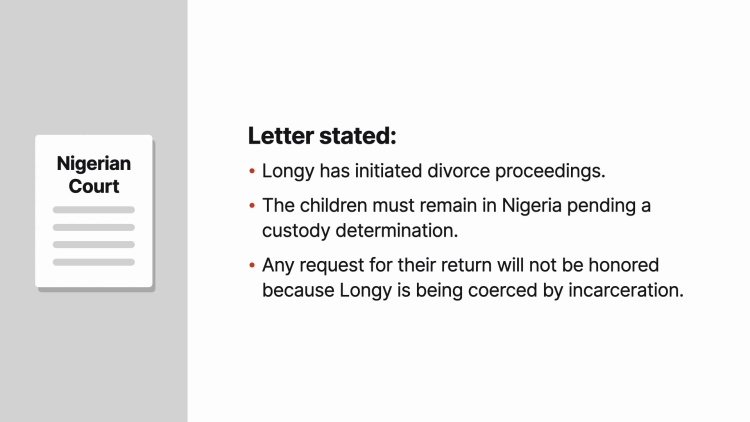Anyanwu v. Anyanwu
New Jersey Superior Court, Appellate Division
339 N.J. Super. 278, 771 A.2d 672 (2001)
- Written by Rose VanHofwegen, JD
Facts
Edith (plaintiff) and Longy Anyanwu (defendant) emigrated from Nigeria and had two children in the United States. After their marriage deteriorated, Edith obtained a restraining order against Longy. When the family traveled to Nigeria together to see relatives in 1997, Edith claimed Longy took her passport and kept her from the children. Edith returned alone to the U.S., fearing for her safety. Longy returned later without the children. Edith sued to get them back. The court ordered Longy to produce the children and jailed him for contempt after he failed to do so. Longy appealed, claiming he could not produce the children because his father refused to return them. Longy produced a letter from a Nigerian court stating it had assumed jurisdiction over the children and would not honor anything Longy signed, as the court considered it a result of duress while Longy remained imprisoned. After an appellate court clarified that the contempt order required Longy only to use best efforts, the trial court ordered Longy to send requests to his father, the Nigerian president, and the American embassy in Nigeria, seeking the children’s return. Meanwhile, one of the children died. In 1999, Longy again requested release, but the court refused, finding he had made no efforts to comply. When Longy again requested release in 2001, the court held a hearing. Neither party testified, but Longy produced a brief he wrote himself and letters from the American embassy and a lawyer from an African civil-rights center claiming Longy could not procure custody of the children. The court ordered Longy released, reasoning that continuing his nearly four-year imprisonment would not induce compliance. Edith appealed.
Rule of Law
Issue
Holding and Reasoning (Collester, J.)
What to do next…
Here's why 907,000 law students have relied on our case briefs:
- Written by law professors and practitioners, not other law students. 47,100 briefs, keyed to 996 casebooks. Top-notch customer support.
- The right amount of information, includes the facts, issues, rule of law, holding and reasoning, and any concurrences and dissents.
- Access in your classes, works on your mobile and tablet. Massive library of related video lessons and high quality multiple-choice questions.
- Easy to use, uniform format for every case brief. Written in plain English, not in legalese. Our briefs summarize and simplify; they don’t just repeat the court’s language.





